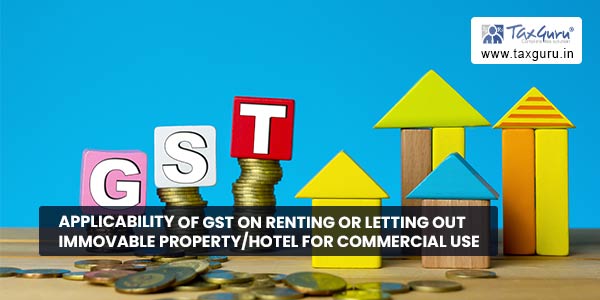Applicability of GST on renting or letting out immovable property/Hotel for commercial use under GST
Relevant provision of the GST Act & Rules
1. Section 2(71) of CGST Act: Location of supplier of service not Goods
2. Section 2(85) of CGST Act: Place of Business
3. Section 22(1) of CGST Act: Person Liable for registration
4. Section 22(1) of SGST Act: Person liable for registration under SGST
5. Section-12(3) of IGST Act- Place of supply
Lets take a example
Q: Mr. A having a property situated in Delhi and let out to Mr.B, whereas Mr.A ( assume turnover is more than 20 Lakh) is registered in Hryana and the recipient Mr A is registered in the state of U.P. Now the question arise in mind are as under;
– Where is the place of supply?
– Whether this transaction is Intra-state supply or Inter- State supply?
– Whether Mr.A has to take registration in Delhi also if he is already registered in Hryana?
– GST is the destination based tax whether motive of law maker is mitigated in this situation if we charge IGST ?
Now we will elaborate the provisions of GST Law.
Section 2(71) deals with location of supplier of “services” which is one limbs of deciding whether the supply is Intra-state or inter- state, if both “location of supplier” and “place of supply” is in one State/UT then that supply is intra- state otherwise inter-state as we all know.
> Section 2 (71) “location of the supplier of services” means, —
(a) where a supply is made
♦ from a place of business for which the registration has been obtained,
♦ the location of such place of business;
(b) where a supply is made
♦ from a place other than the place of business for which registration has been obtained
♦ (a fixed establishment elsewhere), the location of such fixed establishment;
(c) where a supply is made
♦ from more than one establishment, whether the place of business or fixed establishment,
♦ the location of the establishment most directly concerned with the provisions of the supply; and
(d) in absence of such places, the location of the usual place of residence of the supplier;
> Analysis: Now we can say from section 2(71) we got two things one is “ Place of business” and second that Place of business must got “registration” for making supply.
> Section 2(85) of CGST Act “place of business” includes–
(a) a place from where the business is ordinarily carried on, and includes
♦ a warehouse, a godown or any other place
♦ where a taxable person stores his goods,
♦ supplies or receives goods or services or both; or
(b) a place where a taxable person maintains his books of account; or
(c) a place where a taxable person is engaged in business through an agent, by whatever name called;
> Analysis: While analysis section 2(85) which kind of place required a registration then we can say in our case the “place from where the business is ordinarily carried on and from where a taxable person supplies or receives goods or services or both” that place is considered as place of business and need registration so in our example Mr. A is also supplying taxable services from “Delhi” as Mr. A supplies or receives services from that Delhi location. Here one thing I want to clarify the place of business decide the place from where a taxable person makes supply that place needs to got registered, don’t confusion with the “Place of business” with “ Place of supply”.
> Section 22(1): Now It would be relevant to analyse first the difference between sections 22(1) of CGST Act when compared with sections 22(1) of any State GST Act:
|
Section 22(1) of the CGST Act |
Section 22(1) of any SGST Act | |
| Every supplier shall be liable to be registered under this | Every supplier making a taxable supply of goods or | |
| Act in the State or Union territory, other than special category States, from where he makes a taxable supply | services or both in the State shall be liable to be registered | |
| under this Act if his aggregate turnover in a financial year exceeds twenty lakh rupees | ||
| of goods or services or both, if his aggregate turnover in | ||
| a financial year exceeds twenty lakh rupees |
Lets make a comparison between these two section so that we can analyze it properly

|
Point of Difference |
CGST Act | SGST Act |
| Applicable to | Every supplier | Every supplier |
| Responsibility | shall be liable to be registered under this Act | shall be liable to be registered under this Act |
| Jurisdiction | in the State or Union territory from where | in the State |
| Exception | other than special category States | |
| Activity | makes a taxable supply of goods or services or both | making a taxable supply of goods or services or both in the State |
| Criteria | if his aggregate turnover in a
financial year exceeds twenty lakh rupees |
if his aggregate turnover in a
financial year exceeds twenty lakh rupees |
> Place of Supply: Section 12(3) of IGST Act:- Which deals with the Place of supply of services where location of supplier and recipient is in India
Section 12(3) states the place of supply of services, ––
a) directly in relation to an immovable property,
♦ including services provided by architects,
♦ interior decorators, surveyors, engineers and other related experts or estate agents,
♦ any service provided by way of grant of rights to use immovable property or for carrying out or coordination of construction work; or
b) by way of lodging accommodation by
♦ a hotel, inn, guest house, home stay, club or campsite,
♦ by whatever name caled, and including a house boat or any other vessel; or
c) by way of accommodation in any immovable property
♦ for organizing any marriage or reception or matters related thereto, official, social, cultural, religious or business function including
♦ services provided in relation to such function at such property; or
d) any services ancillary to the services referred to in clauses (a), (b) and (c),
shal be the location at which the immovable property or boat or vessel, as the case may be, is located or intended to be located:
Provided that if the location of the immovable property or boat or vessel is located or intended to be located outside India, the place of supply shall be the location of the recipient.
Explanation. ––Where the immovable property or boat or vessel is located in more than one State or Union territory, the supply of services shall be treated as made in each of the respective States or Union territories, in proportion to the value for services separately collected or determined in terms of the contract or agreement entered into in this regard or, in the absence of such contract or agreement, on such other basis as may be prescribed.
> Analysis:
So in the combined reading of section 22(1), 2(71), 2(85) & 12(3). We analyse this as under
1. Section 22(1) state that every supplier shall be liable to be registered under the Act in the State from which he makes a taxable supply of goods or services or both. It is important to note that registration is required ‘in’ the State ‘from which’ taxable supplies are made. Registration is not required ‘in’ the State ‘to’ which taxable supplies are made, even though this is a destination-based tax.
2. Section 2(71) decide the “Location of supplier of service” means where a supply is made for deciding “Place of Business” and that Place needs to be registered. Why that place needs to be registered as section 22(1) says every supplier shall be liable to be registered in the state from which taxable supplies are made.
Note: As there is no need to be concerned that location of supplier of goods is not defined in the law because unlike services, there is sufficient trail available in transactions involving supply of goods.
3. Section 2(85) says that place of business includes a place from where the business is ordinarily carried and from where a taxable person supplies or receives goods or services or both.
4. Section 12(3) deals with the place of supply of service in the case of Immovable property it generally says the Place of supply shal be the location at which the immovable property, is located.
5.
Conclusion: . Now we analyse our example step wise
1. As we can say that the place is to be registered in the State from where every supplier makes a taxable supply of goods or services. In our place “Delhi” from where taxable supply of service is being supplied.
2. So we can say that the Location where the property is located means “ Delhi”, is to be registered as” Place of business” from where the business is ordinarily carried on and from where a taxable person supplies or receives goods or services or both. Once the place of business decided that place is to be registered so Mr. require registration in Delhi.
3. Now we decide place of supply for deciding this particular supply is Inter- State Supply or Intra State Supply, as we discussed section 12(3) said the place would be location of immovable property so in our example “ Delhi”.
4. Here we can say “Place of business” and “place of supply” are not interchangeable so it must be taken care of. Place of business is relevant for the registration and place of supply is relevant for deciding inter state or intra state supply.
5. Now we can say Mr. A has to take registration in the sate of “Delhi” and he took the registration in the state of Delhi and the property is located in Delhi so both limbs for deciding of Intra- State Supply fulfill in Delhi and this transaction is intra state supply.
6. Further one more thing I will say if we decide this transaction is intra state then the motive of law that GST is consumption and destination based tax completely fulfill as the destination and service consuming state is Delhi in our Case.
7. One additional point we can say there could be some tax planning which can be done in the case if a corporate is making conference in other state where he is not registered and the hotel charges CGST and SGST instead of IGST and there is definitely loss of ITC for charging of room rent, conference hall rent, etc which is eligible ITC as these services are not under block credit u/s 17(5) and we can take ITC by doing a tax planning.
Disclaimer: The contents of this article are for information purposes only and do not constitute an advice or a legal opinion and are personal views of the author. It is based upon relevant law and/or facts available at that point of time and prepared with due accuracy & reliability. Readers are requested to check and refer relevant provisions of statute, latest judicial pronouncements, circulars, clarifications etc before acting on the basis of the above write up. The possibility of other views on the subject matter cannot be ruled out. By the use of the said information, you agree that Author / TaxGuru is not responsible or liable in any manner for the authenticity, accuracy, completeness, errors or any kind of omissions in this piece of information for any action taken thereof. This is not any kind of advertisement or solicitation of work by a professional.





